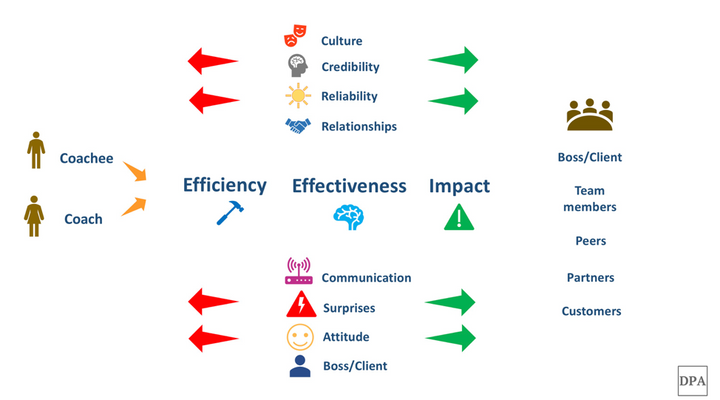Being more effective when the boss' behavior changes

I recently coached a manager whose relationship with her VP had changed during the past few months. Up to that point, the multi-year partnership had worked well, but the VP was now making comments in staff meetings that left the manager feeling undermined and betrayed. She was confused and thought that she had done something wrong.
The first reaction we have when things change with a boss is to wonder what we did wrong. On occasion, we did something to invite the behavior. More frequently, something has changed in the boss’ world that has nothing to do with us, but we are in the line of sight and become convenient targets on which to vent frustration.
Step one is to ask: What else could this mean? And then open ourselves up to other possibilities. It could say that the boss or his boss is having a bad day. A delayed project may be causing stress. Something may have happened at home. Perhaps the stress of a recent acquisition is taking its toll. By considering other possibilities, we put ourselves into a more resourceful place to help. Armed with our new thinking, we can do some things. One approach is to ignore the behavior and continue to do our jobs. Another is to decide to confront the boss and offer our support and help positively.
If we decide to speak to the boss, we must make it safe for them, or they will likely become defensive. It may take multiple attempts to restore safety for them to see us as part of the solution. This solution requires courage and reframing for most of us. The courage to confront a boss creates a fear dynamic. The reframing is to help him understand we are trying to help, not shame or undermine. The discussion is about restoring relationships by acting as a contribution to the boss and the team, not about making ourselves feel better.
We also have another challenge, and that is to be sure we are talking to the boss about the right problem. This is sometimes difficult because of a tendency to guess what’s wrong and miss the mark. Framing the discussion with an opening such as this may help: “We’ve had a long and productive relationship, and I’ve noticed something seems to have changed between us and I’d like to help resolve it.” The boss may be defensive or deflect the discussion by saying something like, “There’s nothing wrong, I don’t know why you think there is.” You may respond with, “I’ve always had your back, and I want to help in any way I can. Let me know.” And then leave the encounter.
Based on his reaction, you may sense an opening and say, “The entire company has been under stress due to the ownership change. I know you’ve had most of that responsibility fall on your shoulders. That can’t be easy for you. I am here to help however I can.” The boss may open up to a broader discussion because you did not make him wrong, shame him, or attack him. You are acknowledging what you believe he may be feeling and noting that others sense the pressure and you want to be part of the solution. This approach may help the boss take down the defensive walls long enough to have a productive discussion.
You may say, “But you don’t know my boss.” And you’d be right. The more important question is “Do you know your boss?” Or are you telling a story about your boss from experience and the current situation is due to something different than you believe? This is the power of using tentative language, asking to be part of the solution, and making sure you are talking about the right problem, with their inputs rather than your guesswork.
All of us show up differently during a month and year as employees. Often, it’s due to normal stresses at work colliding with normal or abnormal pressures at home. Whether a sick parent or child; relationship issues with a parent, partner or spouse; financial struggles; or personal health issues, life happens while we make plans.
In times of organizational upheaval (e.g., post-merger or acquisition, loss of a significant client, financial duress) our styles under stress drive behavior that rarely leads to a display of our best selves. The cascading pressure makes leaders feel like they are not big enough for the task. They become overwhelmed by running the business and changing it simultaneously. Timelines for projects shrink, resources become scarce, and leader resourcefulness stretches to its limits. At precisely the time we should be asking for help, we tell ourselves doing so displays our weakness as leaders. We worry about serving the owners, customers, and employees. At night, instead of sleeping, we stare at the ceiling worrying about making the wrong decision or merely falling short in executing our responsibilities. Allowing others to help requires trust, but it remains the best way to get out of our heads, move past overwhelm, relieve the pressure, and rapidly solve our pressing problems.
In the above example, the first discussion met with defensiveness. Within a few days, the company added a new staff member who allowed the VP to offload some of her overwhelming workload and its related stress. With relief in sight, the manager and VP followed up resulting in a return to the productive discussions of their multi-year relationship. It also led the VP to acknowledge that the strain had impacted her treatment of the manager. She also thanked the manager for reaching out to help. The manager had asked — What else could this mean? As a result, she came back to each discussion having reframed the problem. It transformed from, “What did I do wrong?” to “How can I help relieve the pressure on my VP?” And the question she asked in her head, “How can I get my relationship back on track with my boss?” was also answered as a result.
If you find that a relationship with a boss or peer changes suddenly, and you aren’t the one who burned the building down with a flaming Hot Pocket, always ask what else could this mean? Presuming it’s about us is egocentric and often wrong. And that presumption frequently locks us up and doesn’t support our best thinking and work. It also doesn’t help the peer or boss get through whatever it is that’s going on.
A final point–when we find ourselves in overwhelm, we often fear to ask other people for help. Don’t mistake others not asking for lack of desire to help. Like us, they may not know how to approach us or fear to do so. Don’t ever run away from high standards, and don’t hesitate to ask for help along the way. We are all in the fight of our lives— a critical battle best fought with others by our side.


